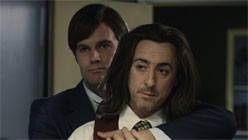From a late-2012 San Francisco perspective, Any Day Now and In the Family feel profoundly anachronistic. Is it the films, which center on gay men fighting for the social acceptance and legal right to raise children in 1970s Los Angeles and present-day Tennessee (respectively), or is it your enlightened and trusted critic? I have to at least concede the possibility that I’m the one who’s out of step, and that my (our?) evolved belief that gay parenting is a non-issue may not be universally endorsed by the majority of our fellow Americans. Then again, perhaps the Supreme Court’s apparent reluctance to weigh in on gay marriage (the court may or may not take up the issue tomorrow) is a signal that they recognize the direction in which our society is moving.
My “education,” notably a handful of documentaries on gay adoption, isn’t everyone’s, admittedly. (Generally, all it takes is one doc to soften long-held stances.) Nonfiction filmmakers nowadays regularly expose and examine social issues years before narrative filmmakers muster the moxie and financial backing, but the average multiplex-going movie fan isn’t seeking out those movies. All of which is to acknowledge that I’m not the representative moviegoer — nor, perhaps, are you.

That said, the films under discussion today absolutely contribute to the time-warp sensation. Based on a true story, Any Day Now takes place in the gay enclave of West Hollywood in 1979, where a loudmouth long-haired drag performer named Rudy (Alan Cumming, reveling in the brashness and sleaze of the period) ekes out a living lip-synching to melodramatic disco ballads in a gay club. In the course of an unusually action-packed 24 hours, he picks up a closeted, clean-cut assistant district attorney (Garret Dillahunt) and takes in Marco, the neglected and ultimately abandoned adolescent child of the junkie down the hall.
Marco has Down Syndrome, so he’s in even greater need of protection, security and care than the average child. Rudy instantly accepts the challenge, and with his new legal-eagle boyfriend creates a home life and statutory strategy that serves Marco beautifully. (Purely on the basis of Cumming and Dillahunt’s appearance, I found myself imagining if Ratso Rizzo and Joe Buck had wanted to adopt a child.) Any Day Now acknowledges that Marco is a catalyst for Rudy to grow up, but the boy is unambiguously the central focus and main beneficiary of the domestic arrangement.



